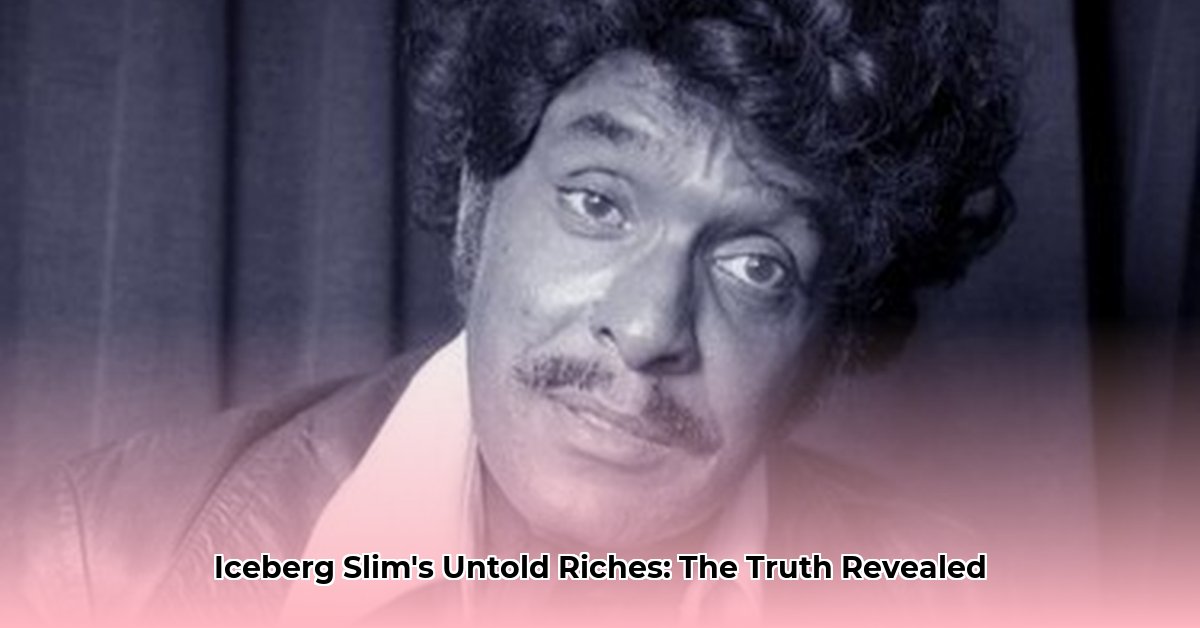
Iceberg Slim Net Worth: Unraveling the Mystery of a Literary Outlaw's Fortune
Robert Beck, known to the world as Iceberg Slim, remains a captivating and controversial figure even decades after his death. His unflinching autobiography, Pimp, shocked and captivated readers alike, propelling him to unexpected literary fame. Yet, the story of Iceberg Slim's wealth is far from straightforward – a complex puzzle with conflicting pieces and missing clues. Was he a man of considerable fortune, or did his literary success fail to translate into the financial riches one might expect? The truth, it seems, is more nuanced than a simple numerical answer. For comparison, see Herve Villechaize's net worth.
The Unexpected Bestseller and the Elusive Fortune
Pimp, a brutally honest account of Slim's life as a pimp, became a surprising bestseller. Its raw, intimate portrayal of the underbelly of American society resonated deeply with a wide audience, leading to translations into numerous languages and securing its place in literary history. This success, however, raises many questions about the financial rewards Slim himself reaped. Reports of Slim's financial status in later life vary dramatically. Some accounts depict relative poverty despite his book's massive success, while others suggest he accumulated a significant fortune, with estimates of his net worth at death reaching as high as $10 million. This vast discrepancy underscores the inherent difficulty in accurately assessing his financial legacy.
Did this level of success translate into personal wealth? What factors influenced his financial reality? Let's explore.
Unraveling the Financial Threads: A Complex Tapestry
The wide range of estimates associated with Iceberg Slim's net worth highlights the inherent challenges in understanding an author's financial success, particularly one whose career spanned periods of significant social and economic change. Several factors likely contributed to this uncertainty:
The Fine Print of Publishing Contracts: Precise details about Slim's agreements with Holloway House, his original publisher, remain scarce. Understanding the exact royalty structure, upfront payments, and any subsequent contract renegotiations is crucial to understanding his income. Was he fairly compensated for his work, or did the publishing house retain a disproportionate share of the profits? Were international sales accurately accounted for and reflected in his earnings? These questions remain largely unanswered.
Beyond the Book: Other Sources of Income: Did Slim have alternative income streams? Did he give lectures, participate in interviews, or explore opportunities to adapt Pimp into a film? These additional revenue streams, if they existed, would significantly alter the overall financial picture. Thorough research into these possibilities is essential to constructing a more accurate portrait of his wealth. How much did Slim gain from these additional revenue streams, if any?
Legal Battles and Their Impact: Legal disputes, particularly concerning unpaid royalties after his death, significantly complicate the task of determining his true net worth. These often lengthy and costly battles could have dramatically affected the amount his estate ultimately received. What was the financial impact of these legal battles on his overall net worth?
Is it possible to determine the exact value of his estate accurately? What research efforts are needed to obtain a more reliable figure?
More Than Money: A Lasting Literary Impact
While determining the precise figure for Iceberg Slim's net worth remains a challenge, his literary influence is undeniable. Pimp has found its way into numerous college and university curricula, sparking ongoing discussions about race, gender, and the complexities of the human experience. His work undeniably impacted subsequent generations of writers, demonstrating the enduring power of narratives that, while controversial, honestly reflect reality. His legacy extends far beyond any monetary value.
How did the success of Pimp impact the broader literary landscape? How did it influence discussions on race, gender, and societal issues? Let's investigate.
The Ongoing Search for Answers: Future Research and Unanswered Questions
To gain a clearer understanding of Iceberg Slim's financial story, more thorough research is vital. Accessing sales records, publishing contracts, and perhaps even tax information would provide a more accurate picture of his income. A careful examination of the legal disputes surrounding his estate and the distribution of his royalties would offer crucial insights into the financial realities of his later years. This deeper investigation is essential not only to understand Slim's personal finances but also to analyze broader issues of fair compensation and potential exploitation within the publishing industry, particularly for writers from marginalized communities. The story of Iceberg Slim's net worth remains an open book, waiting to be fully understood. The path to that understanding involves painstaking research and a willingness to grapple with the complexities of a remarkable life.
What critical steps are needed to better understand Iceberg Slim's financial legacy? What lessons can we learn from his experience? This remains an ongoing area of research and exploration.
How Did Iceberg Slim's Literary Success Impact His Personal Finances?
Key Takeaways:
- Iceberg Slim's raw and controversial novels achieved significant commercial success, selling millions of copies.
- Despite this success, conflicting reports exist about his personal wealth, ranging from a significant fortune to near-poverty at his death.
- This discrepancy highlights potential issues with contract negotiations, exploitation in the publishing industry, and the complexities of measuring an author's true financial success.
- His life and financial situation contextualize broader themes of racial inequality and exploitation within the publishing world.
The multifaceted story of Iceberg Slim's life and legacy continues to fascinate and challenge. Unraveling the mystery of his net worth requires further research and a willingness to confront the complexities of his time and the publishing industry's inherent power dynamics.